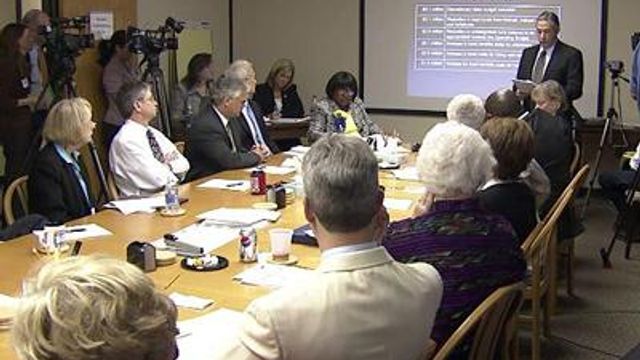Wake schools, comissioners face gloomy fiscal forecasts
The Wake County Board of Education and the Board of Commissioners heard double-barreled bad – if not unexpected – budget news as they held a joint session Wednesday and heard from their respective financial leaders.
The school system's chief business officer, David Neter, and Wake County Manager David Cooke each presented his best guess for the 2010-11 budget year, but both said many factors remain uncertain, especially state funding for the 2010-11 year that begins July 1.
Neter noted that the school system has the added uncertainty of needing to present a proposed budget to the commissioners without knowing how much money they will allocate to the schools. The school board voted Tuesday evening for a $1.4 billion spending plan that assumes county funding – currently about 56 percent of the systems support – will be the same as in 2009-10.
The board also voted to cut 68 employees and to eliminate 57 vacant positions from the personnel chart. The 68 employees got phone calls Tuesday night.
"We're a long way from completing" the school budget, Chairman Ron Margiotta said to the gathering Wednesday. "I'm sure we'll be attending your budget meeting," he remarked to commissioners Chairman Tony Gurley, smiling.
Margiotta and several board of education members urged the commissioners to keep funding at last year's level, though an expected 3,800 new students will reduce the per-pupil support by $63 even with level funding.
"When you look at the reductions that we are seeing plus the increases in terms of additional students, opening schools, the need to hire additional staff, we really need an increase in funding, not just keeping it flat," board member Keith Sutton, who chairs the board's Finance Committee, said after the session.
"I wish there was some magic pot of money that we had that we could draw from in order to be able to better fund the schools. At this point, I haven't found that pot," County Commissioner Betty Lou Ward said.
At the meeting's outset, Margiotta referred to a resolution, passed by the commissioners Monday evening, that worried about possible school resegregation as the school board implements a change from busing students for diversity to assigning them to schools in attendance zones closest to their homes.
It "could be considered in conflict," Margiotta said, but was not on the agenda and would not be brought up Wednesday, he said.
The school system's budget already accommodates $20 million in known state funding cuts, and Gov. Bev Perdue's proposed revisions to the 2009-11 state budget, announced Tuesday, might bring more reductions.
The additional loss could be between 3 percent (another $20 million) and 5 percent ($34million), Neter said.
"We're going to need to be very watchful," he told the group.
Cooke reported that "the county situation is not as bad as the state budget situation," but he added that was the only good news.
"We are not going to see the growth on the property revenue side (of county finances) this year or next year," he told the two boards.
Echoing Neter's view, Cooke said when he showed a slide listing county income that it included "this big 'and the state of North Carolina'" item that no one can predict.
The school board has to present a final budget to the commissioners by May 15. The commissioners and the school board – after getting a final number from the commissioners – have to approve balanced budgets by June 30. Neither group expects to know by then what the Legislature will do with the 2010-11 half of the state budget.
One commissioner asked education leaders about money "left on the table" by a decision not to build a new high school that was to go on a Forestville Road site the schools had bought and that was in the planning stages. Estimates have put that expense at $15 million.
Margiotta said the amount was not clear, however, and added that the money was in the capital budget and could never be used for operations anyway. Gurley reminded the group that the school was not on the agenda, and discussion stopped.
As the meeting began, Margiotta told the group, "These are the worst economic times I've seen in my lifetime 2 and I've been around two years longer than most people."
Before they got the budget rundown, the boards heard a report telling them that Knightdale High School lags behind the district and the state in test scores, students graduating in four years and students taking college-entrance exams that indicate education plans beyond high school.
"Expecting Success," presented by Wake Education Partnership President Ann Denlinger, former Durham schools superintendent, was an overview of a study the partnership did for a group of Knightdale parents and educators.
Denlinger also showed a map showing that student achievement tends to be lower in southeastern Wake County and that income is lowest in that area, too.
Sutton asked if the report has broken out data by race among the poorer areas with low academic performance. The partnership "made a conscious decision not to do that" for this study, Denlinger responded, but she added, "I'm Sir it correlates. It always does."
Neter and several school board members told county officials that the school system is planning on no cuts when the commissioners vote on a county budget in June.
On Tuesday, the school board voted 5-3 for a $1.4 billion proposed budget that includes only current state cuts. More could come, however, as the state deals with its budget deficit and as the school system finds out what the county will fund.
The school board is facing a number of funding challenges with the 2010-11 budget, having to cut $20 million because of low revenue. Another $20 million to $34 million in state funding is likely, although that hasn't been determined just yet.
Among cost-cutting measures implemented Tuesday, the school system eliminated 68 filled and 57 vacant positions in its central services department, which will save about $7 million, Neter said.
Other considerations include going to four-day school weeks, selling naming rights to athletic fields, pay cuts, larger class sizes and fewer school supplies.










